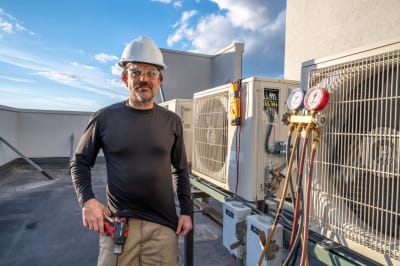HVAC technicians can work on heating, cooling, ventilation, and refrigeration projects. They can work in both commercial and residential capacities, although some may choose to specialize.
In the sections below, we explore the steps needed to become an HVAC technician in Alaska, regardless of specialization. We touch upon each step in the process, from the preparation stage to compliance with state and local regulations.
Candidates curious about the best destinations to receive high-quality training will also discover some notable programs to consider. Lastly, we reveal the annual average salary of HVAC technicians in Alaska and some factors that professionals may improve to move up the salary ladder.
How to Become an HVAC Technician in Alaska
Below are the considerations needed to become an HVAC technician in Alaska.
Step 1: Basic Requirements
The basic requirements to become an HVAC technician in Alaska include a high school diploma or GED, a basic understanding of mathematics, a driver’s license, and the ability to read and write the English language.
Step 2: Enroll in a Training Program
Anyone looking to become an HVAC technician in Alaska must attend a training program. Usually, they can choose between an academic program and an apprenticeship program.
Academic Program
Candidates may choose to complete an academic HVAC technology training program to earn a degree or certificate. This gives them a strong edge in the employment market.
They will also learn key topics such as HVAC controls, calibration instruments, air quality, and resistance. In an upcoming section, we provide some notable examples of the best HVAC training programs.
Apprenticeship Program
Candidates may choose an apprenticeship program for extensive job experience. Although they may not graduate with a degree, those who choose this option will develop a strong familiarity with the real-world demands of the job.
Of course, it is also common for candidates to combine both approaches and enjoy all the advantages.
Step 3: Secure Employment
Before becoming contractors themselves, fresh HVAC technicians in Alaska should work for a while under a licensed contractor. The following section discusses the licensure requirements for those who would like to become administrators and contractors themselves.
Explore trades with similar paths:
Licensure & Certification Requirements
HVAC technicians in Alaska are not expected to be licensed to secure employment. However, to start their businesses, they must receive a Mechanical Contractor License, making them Mechanical Administrators.
Depending on the specialty, the Division of Corporations, Business, and Professional Licensing offers a few licenses for HVAC contractors.
These include the Heating, Cooling, and Process Piping license, Mechanical Systems Temperature Control license, Residential HVAC license, Residential Plumbing and Hydronic Heating License, Unlimited Commercial and Industrial Plumbing license, and Unlimited Refrigeration license, among others.
Top HVAC Technician Schools in Alaska
The following are some of the most prominent destinations in Alaska where you can receive training as an aspiring HVAC technician.
Charter College
Anchorage, AK Online + Campus
Charter College is one the most popular destinations for HVAC training in Alaska. Students here get to enroll in a Certificate in HVAC/R program designed to prepare them for entry-level employment.
Tuition
$13,500 - $22,440 per ProgramContact
(907) 277-1000
contact@chartercollege.edu
University of Alaska, Anchorage
Anchorage, AK Online + Campus
The University of Alaska in Anchorage offers an HVAC Occupational Endorsement Certificate program for interested candidates in Alaska.
Tuition
$7,508 - $21,635Contact
(907) 786-1480
uaa.admissions@alaska.edu
Alaska Vocational Technical Center
Seward, AK Campus Only
At the Alaska Vocational Technical Center, students can enroll in a high-quality HVAC Technology program accredited by PAHRA. Training includes 630 clock hours and provisions for OSHA safety certification and EPA 608 certification.
Tuition
$3,287 - $13,299Contact
(907) 224-3322
admissions@avtec.edu
Explore HVAC technician schools in Alaska by City:
Salary & Career Outlook
An average salary earner working in HVAC technology in Alaska will go home with a salary of around $76,700 at the end of the year. This is according to an extensive survey of HVAC techs in the state.
The same survey also revealed that candidates can increase their yearly returns by acquiring more experience, moving to a better location or employer, and acquiring specialty skills.
Those who have maximized their earning to be among the top 10% may earn as much as $125,501 at the end of the year, while those who are just starting may take home an annual average salary of $46,875.
The best locations include Juneau, with an annual average salary of $88,356; Fairbanks, with an annual average salary of $86,454; and Anchorage, with an annual average salary of $72,970. Wasilla is also a viable alternative, with an annual average salary of $68,399.





